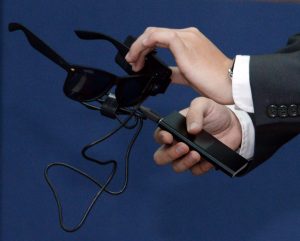Mexico City, Feb 7 (EFE).- A Mexican engineering student has designed a prototype for “smart lenses” that will help people with vision problems identify faces, read and translate texts, as well as improve their overall quality of life.
“Smart lenses (occurred to me) after at work there was someone with weak eyesight and I became aware of their needs,” the lenses’ creator, Daniel Martinez Macedo, told EFE.
“With the help of technology, we’re seeking to improve the quality of life for these people, so that they can know what’s around them without needing someone else’s help,” he said.
The eyeglasses are outfitted with an 8-megapixel camera that takes pictures and analyzes information, whereby the user can get details of animals, surroundings, people and even read texts and translate them from English to Spanish.

“This could change the lives of people who can’t … read a menu in a restaurant, or (help) students read academic texts,” said Martinez Macedo, a student at the engineering school at Mexico’s National Autonomous University (UNAM).
The prototype, which took a little over a year to develop, has an Internet connection, Bluetooth, and it works in real time, taking just 3-5 seconds to provide a response to the user.
“The lenses connect to the Internet, and information can be obtained to … transmit to the user,” Martinez Macedo said.
In addition, the device can be connected to a wireless network or a cellphone’s data network, thus making its use easier.
At present, Martinez Macedo said, only a prototype exists and between three and five million pesos ($160,000-$268,000) will be needed “to build the next versions with better quality.”
If he can obtain financing, the prototype could be transformed into reality within about six months, he said, at an estimated cost to the public of between 3,000-6,000 pesos ($160-$321) per pair of smart-lens glasses.
World Health Organization figures indicate that 253 million people worldwide have visual impairments, of whom 217 million suffer moderate to serious impairment.
In Mexico alone, in 2015 there were more than 1.5 million people with some kind of visual impairment.
